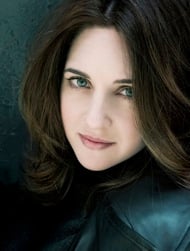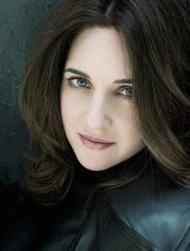Ranging from Bach to Copland to Webern, pianist Simone Dinnerstein’s April 24 recital at Herbst Theatre looked at first glance like a model of eclecticism. In fact, it was a tightly and cannily structured program, with variations as the organizing principle. Three of the five pieces advertised that fact in their titles. The other two — Schubert’s four Impromptus and Bach’s French Suite No. 5, with its assorted dance movements — have defining musical pivot points, as well.

All of this was fitting for an artist who made her first big splash with Bach’s “Goldberg Variations,” which she recorded to great acclaim on Telarc in 2007. For those checking up on her credentials with that composer, Dinnerstein confirmed them with a sparkling, sensitive account of the G-major French Suite, capping it off with a blazingly fast and excitingly bravura Gigue. But by placing the Bach at the very end of her program, she might have been suggesting that much of the listeners’ attention belonged elsewhere. Indeed it did.
The highlights of the evening, presented by Chamber Music San Francisco, came in the selections that opened the first and second halves of the program. With Copland’s Piano Variations, a flinty 1930 work from the composer’s hard-edged abstract period, Dinnerstein made a vivid, even caustic impression.
The intervals in the first statement of the theme were etched with an acidic decisiveness that persisted throughout the piece. Even in the gentlest variations that was apparent, like a printmaker’s faint but clearly discernible mark on the most fragile paper. In the more turbulent passages, whether in a fury of full chords or scalding pizzicato, Dinnerstein played with a kind of semaphoric urgency. Everything seemed pared down and vital. Yet none of it felt ascetic or parched. The performer lingered over Copland’s haunting sonorities and built a cumulative, austere eloquence. It was a wonderful and often wonderstruck account of this fine work.
Greater Lasser Variations
In an altogether different, seductively ravishing vein, Dinnerstein triumphed in American composer Philip Lasser’s 2002 Twelve Variations on a Chorale by J.S. Bach, Nimm von uns, Herr, du Treuer Gott, from Cantata 101. Shades of Debussy, Reichian repetition, and Ravel’s Le Tombeau de Couperin filtered through Lasser’s prismatic treatments of the chorale. Dinnerstein kept uncovering new regions of color and warmth. She was by turns lyrical, wistful, frenetic, elegiac. Variations were spun out in graceful long lines or voiced in a dramatic sotto-voce. Arpeggios shimmered. Inner voices shone through. Serenity gave way to agitation, which was then absorbed in a deeper calm. It made you want to hear this resourceful pianist play other repertoire — Chopin, perhaps, and Scriabin. The audience got a hint, in one of Mendelssohn’s Songs Without Words, done as a sweetly tender encore.
Some of those same values emerged in the Bach French Suite that followed Lasser’s Variations. Dinnerstein gave the repeats in the Allemande a ghostly second presence. The Sarabande became a display case for carefully faceted ornaments. Webern’s Variations for Piano, Op. 27, and the Schubert Impromptus, by contrast, gave the evening its unfortunate back-to-back droop.
Dinnerstein’s dry and lifeless phrasing fixed neither the poignance nor the pungency in the Webern. And while there were moments of grace and fluidity in the Schubert, the performer seemed to lose focus and concentration. Passages were blurred and notes dropped. Velocity was the overriding imperative in the E-flat major Impromptu. The singing lines were sometimes muffled or routine. It was time for intermission. Afterward, as if recharged, Dinnerstein began her glorious exploration of a Bach chorale.

